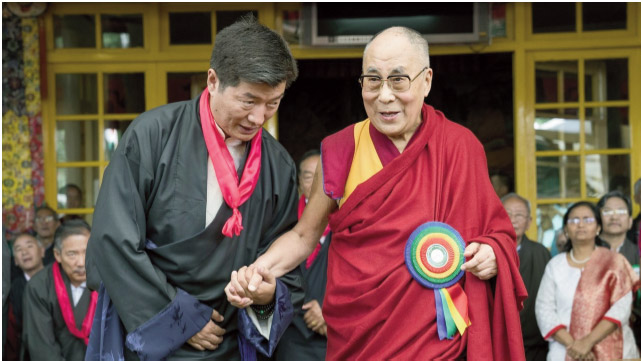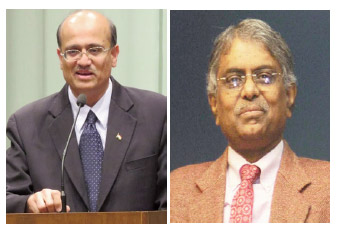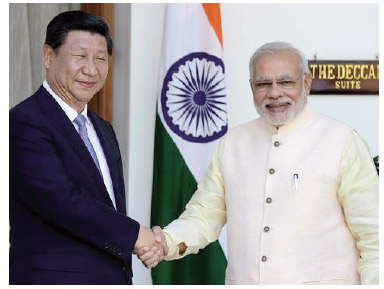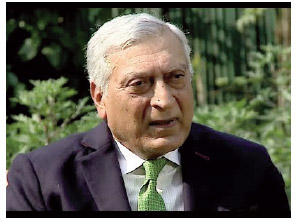Buckling under
Dragon's pressures
 The Dalai Lama with Lobsang Sangay, the leader of the Central Tibetan
Administration, Dharamsala
The Dalai Lama with Lobsang Sangay, the leader of the Central Tibetan
Administration, Dharamsala
 Vijay Gokhale and P K Singh
How come the Modi
government is
showing signs of
buckling under
Chinese pressure
on India's Tibetan
policy since then Prime Minister
Jawaharlal Nehru gave shelter to
thousands of refugees and the
Dalai Lama in 1959 on
humanitarian grounds? The first
sign of this change in India's
stance on the Dalai Lama became
publicly visible when Foreign
Secretary Vijay Gokhale sent a
note to Cabinet Secretary P K
Singh asking him to send out a
directive to senior officials to stay clear of the two events – interfaith
prayer on March 31 and
"Thank you, India" on April 1,
marking the Dalai Lama's 60th
year of exile. The exiled Tibetan
leader first stepped foot on March
31, 1959.
Vijay Gokhale and P K Singh
How come the Modi
government is
showing signs of
buckling under
Chinese pressure
on India's Tibetan
policy since then Prime Minister
Jawaharlal Nehru gave shelter to
thousands of refugees and the
Dalai Lama in 1959 on
humanitarian grounds? The first
sign of this change in India's
stance on the Dalai Lama became
publicly visible when Foreign
Secretary Vijay Gokhale sent a
note to Cabinet Secretary P K
Singh asking him to send out a
directive to senior officials to stay clear of the two events – interfaith
prayer on March 31 and
"Thank you, India" on April 1,
marking the Dalai Lama's 60th
year of exile. The exiled Tibetan
leader first stepped foot on March
31, 1959.
The events which were
scheduled to take place in New
Delhi were cancelled. However,
the "Thank you, India" event was
shifted to Dharamsala.
Interestingly, the Foreign
Secretary's note was sent on the
eve of his visit to Beijing on
February 22. It said that the
events were taking place at a
"sensitive time in the context of
India's relations with China".
For
China, of course, Tibet was always
"a sensitive issue". But India has
always considered Tibet and its
people as a cultural and
humanitarian matter, right from
Nehru days. Why should South
Block mix up a humanitarian
issue with political sensitivities of
Beijing?
This is all the more surprising
since Prime Minister Modi was
seen particularly pro-Tibet. He
even went to the extent of inviting
President of the Tibetan
government in exile Lobsang
Sangay for his swearing-in
ceremony in 2014. Just a few
months later, an inter-faith
conference, similar to the one
cancelled this month, was held
after President Jinping Xi's visit to
India.
It may be recalled that during
his meeting with President Xi in
September 2014, Prime Minister
 Narendra Modi with Xi Jinping
Modi even refused reference to
the one-China policy in the
bilateral agreement despite Xi's
insistence. New Delhi then
insisted that Beijing should first
"stop questioning India's
sovereignty over Arunachal
Pradesh and Jammu and Kashmir.
Narendra Modi with Xi Jinping
Modi even refused reference to
the one-China policy in the
bilateral agreement despite Xi's
insistence. New Delhi then
insisted that Beijing should first
"stop questioning India's
sovereignty over Arunachal
Pradesh and Jammu and Kashmir.
Apparently, New Delhi's latest
stance is "out of character" for the
Modi government. Doesn't it
indicate that the Foreign Office is
reassessing its China policy in the
face of Beijing's aggressive
postures, starting with the
Doklam stand-off and fresh
Chinese build-up in the
Himalayan areas etc.
Even China's
sole strongman President Xi has
given enough indications that he
is no different from Mao in
pursuing China's geo-political
goals and territorial ambitions.
The moot point now is: will the
South Block's Tibet-related latest
gestures bring about a change of
heart in Beijing vis-à-vis New
Delhi? I doubt it, though foreign
Secretary Vijay Gokhale, who
seems to have set the ball rolling
for New Delhi's new policy
towards Beijing, is a wellintentioned
person. He was
India's ambassador to Beijing till
recently. So, he is quite familiar
with the Chinese establishment.
I am, however, not sure what
exactly are his calculations
behind India's changed postures
towards the Dalai Lama.
Is it
simply a tactical "rethink" to
arrest the on-going slide in India-
China relationship since 2015? Or,
is he solely taking the burden of
mending the ties with China
without any reciprocal effort on
Beijing's part? I don't have any
straight answer to these queries.
The moot point now is:
will South Block's
Tibet-related latest
gestures bring about a
change of heart in
Beijing vis-à-vis New
Delhi? I doubt it,
though foreign
Secretary Vijay
Gokhale, who seems to
have set the ball
rolling for New Delhi's
new policy towards
Beijing, is a wellintentioned
person. He
was India's ambassador
to Beijing till recently.
So, he is quite familiar
with the Chinese
establishment.
Having visited China on a few
occasions, I can only say that it is
quite a Herculean task to
understand the mindset of the
Chinese leadership. In my
attempt to understand China, I
always keep Mao's famous dictum
"Signal Right, Turn Left" at the back of my mind.
I am of the view that our
leaders invariably allow
themselves to be carried away by
the old-world sentiments of
"Hindi-Chini bhai-bhai" of the
fifties. Let us not forget what
happened in 1962 following the
Panchsheel agreement with
Beijing wherein we virtually
surrendered our geo-political
interests in the Tibetan region,
hoping that China would honour
its words and provide Tibet "full
autonomy" and related religious
and cultural freedom.
What
happened subsequently is a tragic
tale of history. The Dalai Lama's
flight from his homeland along
with thousands of refugees is part
of that Great Indian Tragedy.
I, however, must compliment
Jawaharlal Nehru for keeping
alive the great Indian tradition of
humanitarianism alive and
welcoming the Tibetans in
distress with open arms.
What is,
however, disquieting is that under
the Modi regime even two
humanitarian events – an interfaith
prayer led by the exiled
spiritual leader and "Thank you,
India" – were not allowed to take
place in New Delhi. Equally
regrettable is that Prime Minister
Narendra Modi is yet to have had
an official meeting with the Dalai
Lama. What a pity!
I am not sure whether Vijay
Gokhale's hope "to build on the
convergences between India and
China and address differences on
the basis of mutual respect and
sensitivity to each other concerns,
interests and aspirations" would
be fulfilled in the days to come.
Of course, "an antagonistic
relationship with China does not
benefit India". But "antagonizing"
posturing has never been India's
policy. It has been China's
prerogative. We look at the
support for the Dalai Lama on
humanitarian grounds. If Beijing
is extra sensitive on the Dalai
Lama, the problem lies with the
I agree with former
foreign Secretary Kanwal
Sibal that "past record
has shown that China
hasn't changed one bit".
Still, we have taken upon
ourselves "the burden of
reaching out to China".
 Kanwal Sibal
Chinese. They have managed to
forcibly occupy the Tibetan
territory, but have so far to win
the hearts of Tibetans. This
reflects poorly on China's
expansionist policies and
its strong-arm tactics of
repression and suppression.
In fact, New Delhi has reasons
to be upset the way Beijing has
been playing Pakistan's terror
card to add to New Delhi's
problems. But the Chinese
leadership hardly cares for Indian
sensitivities!
Kanwal Sibal
Chinese. They have managed to
forcibly occupy the Tibetan
territory, but have so far to win
the hearts of Tibetans. This
reflects poorly on China's
expansionist policies and
its strong-arm tactics of
repression and suppression.
In fact, New Delhi has reasons
to be upset the way Beijing has
been playing Pakistan's terror
card to add to New Delhi's
problems. But the Chinese
leadership hardly cares for Indian
sensitivities!
In the circumstances, I do not
feel happy the way Gokhale has
put even India's humanitarian
dynamism of foreign policy in the
reverse gear. He seems to ignore
the Asian giant's historical track
record and President Jinping Xi's
Mao-like mindset. I agree with former foreign Secretary Kanwal
Sibal that "past record has shown
that China hasn't changed one
bit". Still, we have taken upon
ourselves "the burden of reaching
out to China". He further states
that since "we seem to have made
a gesture, we need to see whether
China is willing to make some
gesture of its own towards us and
inject a note of realism in the
border talks".
Well, China's economic and
military power has grown
tremendously since the 1962
conflict. It is riding high under the
new strongman at the helm of
affairs in Beijing. So, where is the
scope for China's "realism" that
our Foreign Secretary might be
looking for ?
--Hari Jaisingh




 The Dalai Lama with Lobsang Sangay, the leader of the Central Tibetan
Administration, Dharamsala
The Dalai Lama with Lobsang Sangay, the leader of the Central Tibetan
Administration, Dharamsala Vijay Gokhale and P K Singh
Vijay Gokhale and P K Singh Narendra Modi with Xi Jinping
Narendra Modi with Xi Jinping Kanwal Sibal
Kanwal Sibal